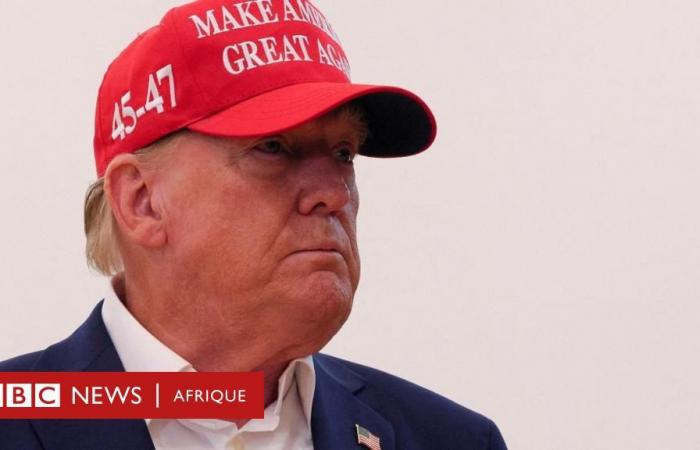Photo credit, Getty Images
- Author, Tom Bateman
- Role, BBC State Department Correspondent
- Reporting from Washington DC
-
9 hours ago
Donald Trump's return to the White House is expected to reshape U.S. foreign policy, promising potentially sweeping changes on multiple fronts as war and uncertainty grip parts of the world.
During his campaign, Mr. Trump made broad policy commitments, often without specific details, based on the principles of non-interventionism and trade protectionism – or, as he himself puts it, “America of America”. 'on board “.
His victory signals one of the biggest potential disruptions to Washington's approach to foreign affairs amid parallel crises in many years.
The comments he made during his campaign and the results he achieved during his term from 2017 to 2021 allow us to outline his likely approach in different areas.
Russia, Ukraine and NATO
During the campaign, Mr. Trump repeatedly said he could end the war between Russia and Ukraine “in a day.” When asked how, he suggested overseeing a deal, but declined to elaborate.
According to a May research paper by two of Mr. Trump's former national security chiefs, the United States should continue to provide weapons to Ukraine, but condition that support on kyiv's engagement in peace talks with Russia.
To seduce Russia, the West would promise to delay Ukraine's much-desired entry into NATO. The former advisers said Ukraine should not abandon its hopes of recovering all of its territory from Russian occupation, but should negotiate based on current front lines.
Mr. Trump's Democratic opponents, who accuse him of cozying up to Russian President Vladimir Putin, say his approach amounts to a capitulation for Ukraine and will endanger all of Europe.
Mr. Trump has always said that his priority is to end the war and stem the hemorrhage of American resources.
It's unclear to what extent the former advisers' document represents Mr. Trump's thinking, but it is likely to give us an idea of the type of advice he will receive.
His “America First” approach to ending the war also extends to the strategic question of the future of NATO, the “all for one, one for all” transatlantic military alliance created after World War II. originally to provide a bulwark against the Soviet Union.
Photo credit, Getty Images
NATO now has more than 30 countries and Mr. Trump has long been skeptical of the alliance, accusing Europe of disregarding America's promise of protection.
Whether it would actually withdraw the United States from NATO, marking the most significant change in transatlantic defense relations in nearly a century, remains a matter of debate.
Some of its allies suggest its hard line is just a negotiating tactic aimed at getting members to respect the alliance's defense spending guidelines.
In reality, NATO leaders are seriously concerned about what its victory means for the future of the alliance and how its deterrent effect is perceived by hostile leaders.
The Middle East
As with Ukraine, Mr. Trump promised to bring “peace” to the Middle East, implying that he would end the war between Israel and Hamas in Gaza and the war between Israel and Hezbollah. in Lebanon, but he did not specify how.
He has repeatedly said that if he had been in power rather than Joe Biden, Hamas would not have attacked Israel because of its policy of “maximum pressure” on Iran, which funds the group.
Overall, it is likely that Mr. Trump will attempt to return to this policy, which saw his administration withdraw the United States from the Iran nuclear deal, implement tougher sanctions against Iran and kill General Qasem Soleimani, Iran's most powerful military commander.
At the White House, Mr. Trump adopted strongly pro-Israel policies, designating Jerusalem as Israel's capital and moving the U.S. embassy there from Tel Aviv, which energized the evangelical Christian base. of Mr. Trump, a core group of Republican voters.
Israeli Prime Minister Benjamin Netanyahu called Mr. Trump “the best friend Israel has ever had in the White House.”
But his critics say his policies have had a destabilizing effect on the region.
Palestinians have boycotted the Trump administration over Washington's abandonment of their claim to Jerusalem, the city that constitutes the historic center of Palestinian national and religious life.
They were further isolated when Trump negotiated the “Abraham Accords,” a historic agreement aimed at normalizing diplomatic relations between Israel and several Arab and Muslim countries. This agreement was reached without Israel having to accept a future independent Palestinian state alongside it – the so-called two-state solution – which was previously a condition set by Arab countries for this type regional agreement.
The countries concerned were given access to advanced American weapons in exchange for recognition of Israel.
The Palestinians have been left at one of the most isolated points in their history by the only power that can truly exert leverage over both sides of the conflict, further eroding their ability to protect themselves on the ground.
During the campaign, Mr. Trump repeatedly said he wanted the Gaza war to end.
He has had a complex, sometimes dysfunctional, relationship with Mr. Netanyahu, but he certainly has the ability to pressure him.
He also has a history of maintaining close relations with the leaders of major Arab countries that have contacts with Hamas.
It is unclear how he will reconcile his desire to provide strong support to Israeli leaders and his desire to end the war.
Mr. Trump's allies have often touted his unpredictability as a diplomatic asset, but in a highly contested and volatile Middle East, in the midst of a crisis of already historic proportions, it is far from clear how this plays out. would pass.
Mr. Trump will have to decide how — or whether to — advance the stalled diplomatic process launched by the Biden administration to secure a ceasefire in Gaza in exchange for the release of hostages held by Hamas.
China and trade
The United States' approach to China is the most strategically important area of foreign policy – and the one with the greatest implications for global security and trade.
While in office, Donald Trump called China a “strategic competitor” and imposed tariffs on some Chinese imports into the United States. This triggered a response from Beijing which imposed tariffs on US imports.
Efforts were made to defuse the trade conflict, but the Covid pandemic dashed that possibility, and relations took a turn for the worse when the former president referred to Covid as the “Chinese virus.”
While the Biden administration claimed to be taking a more responsible approach to China policy, it actually maintained many tariffs on imports dating from the Trump era.
Trade policy has become closely tied to American voters' perceptions of the protection of American manufacturing jobs, even as the long-term decline in employment in traditional American industries, such as steel, is due as much to factory automation and changes in production as to global competition and offshoring.
Mr. Trump praised Chinese President Xi Jinping, whom he called both “brilliant” and “dangerous,” and a highly effective leader who controls 1.4 billion people in a “iron fist”, part of what his opponents have described as Mr Trump's admiration for “dictators”.
The former president appears to be moving away from the Biden administration's approach of strengthening U.S. security partnerships with other countries in the region to try to contain China.
The United States has maintained military assistance to Taiwan, a self-ruled island that China views as a breakaway province that will eventually come under Beijing's control.
In October, Mr. Trump said that if he returned to the White House, he would not have to use military force to prevent a Chinese blockade of Taiwan because President Xi knew he was “crazy.” and that he would impose crippling tariffs on Chinese imports if that happened.






